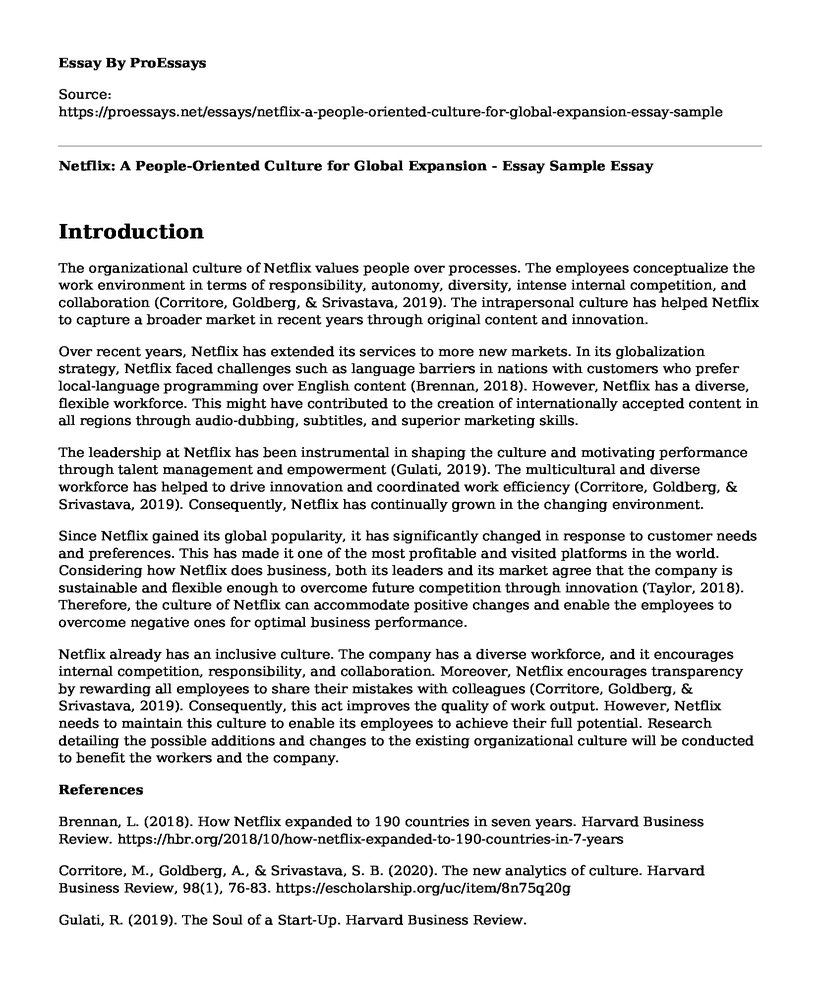Introduction
The organizational culture of Netflix values people over processes. The employees conceptualize the work environment in terms of responsibility, autonomy, diversity, intense internal competition, and collaboration (Corritore, Goldberg, & Srivastava, 2019). The intrapersonal culture has helped Netflix to capture a broader market in recent years through original content and innovation.
Over recent years, Netflix has extended its services to more new markets. In its globalization strategy, Netflix faced challenges such as language barriers in nations with customers who prefer local-language programming over English content (Brennan, 2018). However, Netflix has a diverse, flexible workforce. This might have contributed to the creation of internationally accepted content in all regions through audio-dubbing, subtitles, and superior marketing skills.
The leadership at Netflix has been instrumental in shaping the culture and motivating performance through talent management and empowerment (Gulati, 2019). The multicultural and diverse workforce has helped to drive innovation and coordinated work efficiency (Corritore, Goldberg, & Srivastava, 2019). Consequently, Netflix has continually grown in the changing environment.
Since Netflix gained its global popularity, it has significantly changed in response to customer needs and preferences. This has made it one of the most profitable and visited platforms in the world. Considering how Netflix does business, both its leaders and its market agree that the company is sustainable and flexible enough to overcome future competition through innovation (Taylor, 2018). Therefore, the culture of Netflix can accommodate positive changes and enable the employees to overcome negative ones for optimal business performance.
Netflix already has an inclusive culture. The company has a diverse workforce, and it encourages internal competition, responsibility, and collaboration. Moreover, Netflix encourages transparency by rewarding all employees to share their mistakes with colleagues (Corritore, Goldberg, & Srivastava, 2019). Consequently, this act improves the quality of work output. However, Netflix needs to maintain this culture to enable its employees to achieve their full potential. Research detailing the possible additions and changes to the existing organizational culture will be conducted to benefit the workers and the company.
References
Brennan, L. (2018). How Netflix expanded to 190 countries in seven years. Harvard Business Review. https://hbr.org/2018/10/how-netflix-expanded-to-190-countries-in-7-years
Corritore, M., Goldberg, A., & Srivastava, S. B. (2020). The new analytics of culture. Harvard Business Review, 98(1), 76-83. https://escholarship.org/uc/item/8n75q20g
Gulati, R. (2019). The Soul of a Start-Up. Harvard Business Review. https://alexduchak.com/s/The-Soul-of-a-Start-Up.pdf
Taylor, B. (2018). To see the future of competition, look at Netflix. Harvard Business Review. https://hbr.org/2018/07/to-see-the-future-of-competition-look-at-netflix
Cite this page
Netflix: A People-Oriented Culture for Global Expansion - Essay Sample. (2023, Aug 14). Retrieved from https://proessays.net/essays/netflix-a-people-oriented-culture-for-global-expansion-essay-sample
If you are the original author of this essay and no longer wish to have it published on the ProEssays website, please click below to request its removal:
- Cost Management and Strategic Decision Making
- Bounce Fitness Diversity Policy Draft Research
- Nokia Company Organizational Change Paper Example
- Assignment Example on Time Management
- Essay on NJ Motor Vehicles Commission: Breach of Employee Contract
- Project Management: Comp. UG Sprinkler Sys & Stakeholder Management - Essay Sample
- Essay Example on McKesson CEO Change: Minimal Leadership Changes in Last Decade







